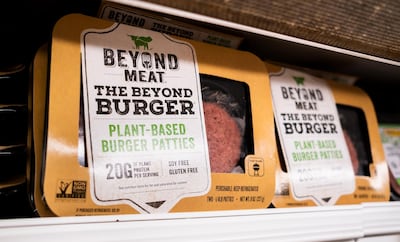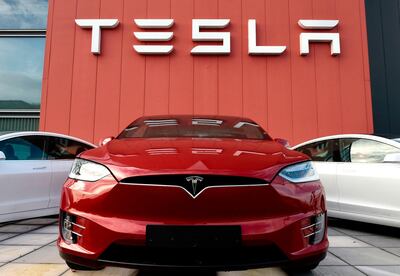When the world's biggest fund manager BlackRock announced in January that it was overhauling its investment strategy to make sustainability the "new standard", many felt the industry had reached a tipping point in its attitude towards climate change.
Chief executive Larry Fink argued that sustainable investing strategies make economic as well as social sense, as companies can no longer afford to ignore their carbon footprint.
A growing number of private investors are asking themselves whether their investment portfolios are sustainable — and investment managers are looking to supply a positive answer.
Socially responsible investing, or SRI, is now big business, worth more than $30 trillion (Dh110.19tn) at the end of 2018, according to the Global Sustainable Investment Allowance, and some claim it could hit $50tn within a decade.
So is your investment portfolio sustainable? With a wide choice of SRI or environmental, social and governance (ESG) investment funds on the market, it is easier than ever to go green with your personal investment portfolio, but you should also approach with caution.
Don't rely on ESG ratings
Maurice Gravier, chief investment officer at Emirates NBD, calls the shift towards sustainable living “one of the biggest investment opportunities in history”, but says ESG should be more than just a fashionable label.
“You also need to look closely at individual companies, to see whether their core business is sustainable. Does it do harm to society or the environment? Is the company run in a way which respects stakeholders and shareholders?”
Too many self-proclaimed sustainable managers apply filters on external data without committing to deeper examination, so you cannot simply buy a fund branded "SRI" or "ESG", but must examine at how it operates.
This involves extra effort on your part, to make sure any fund matches your principles. “You cannot rely purely on external ESG ratings,” Mr Gravier says.
For example, you may be surprised to discover that the biggest stock holding in ESG funds last year wasn’t a wind farm or vegan start-up, but tech behemoth Microsoft, according to financial data company EPFR.
Microsoft does aim to be carbon negative by 2030, but may not have been what ESG investors thought they were getting. Google-owner Alphabet was in second place, followed by Disney and Apple.
Last year, the US Vegan Climate ETF listed on the New York Stock Exchange, pledging to exclude companies involved in animal testing, animal-derived products, or animals in sports or entertainment, as well as fossil fuel, tobacco and arms companies. Again, ethical investors may be surprised by its top six holdings: Apple, Microsoft, Facebook, MasterCard and Visa.

Look for a strong investment case
On the other hand, while you may want to save the planet, you also have to provide for a secure retirement and avoid unnecessary risks. Your financial future also needs to be sustainable.
Mr Gravier says when buying a fund or a stock, the investment case has to be as strong as the moral one. “An electric car should primarily be a good car, not just electric.”
Early stage technology solutions to climate change and other disruptive firms can offer massive opportunities, but are also risky. Hydrogen stocks recently jumped, but this spike may not last.
Vijay Valecha, chief investment officer at Century Financial, says sustainable investing is attractive and funds that seek to play on these trends are likely to outperform, but most investors should spread their risk through index-tracking, low-cost exchange traded funds (ETFs), rather than gambling on individual stocks.
His tips include iShares MSCI KLD 400 Social ETF and iShares MSCI USA ESG Select ETF, both of which track socially responsible US companies.
He also advocates iShares MSCI Global Impact ETF, which tracks firms around the world that address at least one of the world's major ESG challenges, as identified by the United Nations’ 17 Sustainable Development Goals.
Water is an essential part of our daily lives and with the world population burgeoning, the demand for this commodity is only going to rise, Mr Valecha adds. “Invesco S&P Global Water Index ETF will help you capture this trend.”

Be cautious with new trends
One exciting trend is the growing market for alternative meat, which Barclays has predicted will reach $140 billion in a decade, around 10 per cent of the $1.4tn global meat industry.
Laura Suter, personal finance analyst at UK investment platform AJ Bell, says that while veganism and vegetarianism are becoming more popular, with even KFC to Burger King offering vegan options, finding the right firm to invest in can be tricky.
“It is rare to find a food firm that is 100 per cent focused on veganism and vegetarianism — most also have a much bigger meat business as well,” she says.
The best-known option is Los Angeles-based firm Beyond Meat, founded by vegan Ethan Brown to produce plant-based meat substitutes, which floated in May last year at an initial price of $25 a share.
The Beyond Meat share price soared amid great hype, rising nine-fold to spike at almost $235 in July, but has since fallen back and trades at around $90 at the time of writing. Those who bought at its peak will be sitting on a heavy loss.
On Thursday, Beyond Meat posted a 212 per cent rise in fourth quarter net sales to $98.5m, beating expectations of $79.5m, but its share price still slipped as it reported a $500,000 loss after a profitable third quarter.
Buying early-stage companies operating in revolutionary areas is risky. Therefore, Ms Suter also recommends investing in ESG-focused actively managed funds, such as the Securities Trust of Scotland.
“Top holdings include foods company Danone, flavouring brand International Flavours & Fragrances, and nutrition and health company DSM, which should all benefit as more people eat meat substitutes,” she says.
Actively managed investment fund Sarasin Food & Agriculture Opportunities targets companies tackling issues such as animal cruelty, climate change and human health, Ms Suter adds. “It includes Dutch-listed life science company DSM, which is working to make vegan food tastier and reduce emissions from dairy farming.”

Look at reality over hype
The superstar brand among eco-minded customers companies is of course California-based electric vehicle and clean energy company Tesla.
Despite concerns over debt levels and founder Elon Musk's sometimes erratic behaviour, its stock has soared 126.6 per cent over the last year, according to Bloomberg, lifting its market capitalisation to a lofty $123bn.
Again, the risk is that hype is accelerating ahead of reality. Hargreaves Lansdown equity analyst Nicholas Hyett says although recent fourth-quarter revenue beat market expectations to rise 2 per cent to $7.4bn, Tesla still declared a net loss of $775m in 2019, amid heavy investment and the shift towards the lower margin Model 3.
Despite impressive free cash flow of $1bn over the quarter, Mr Hyett is wary, given its current pricey valuation today. “Tesla has a fantastic brand and formidable manufacturing capabilities, but is it really worth more than Volkswagen, which manufactured 10.8 million vehicles in 2018 to Tesla’s 365,000 last year, and posted profits after tax of €12.2bn [Dh49.4bn]?”
The green revolution may be the greatest investment opportunity of the century, but old investment rules apply. Do not put all your cage-free, free-range organic eggs in one basket, no matter how sustainable they may seem.

